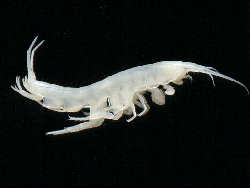Amphipoda

 Falkensteiner Höhle, Germany.
Falkensteiner Höhle, Germany.| Scientific name: | Amphipoda | |
|---|---|---|
| Systematics: | subphylum | Crustacea |
| class | Malacostraca | |
| order | Amphipoda | |
The order Amphipoda (amphipods) includes more than 7,000 species of small, shrimp-like crustaceans. Most amphipods are marine, a few live in freshwater or are terrestrial. Pelagic amphipods live in the water column, benthic live on the ocean/water bottom.
Because of their small size, Amphipoda are able to survive in cave. Benthic amphipods in sweetwater generally libe under rocks and in crevices. And from there it is not far to enter waterfilled caves. It seems, they migrated slowly into the caves and made it their home.
Sometimes they are remains of a former environment, which has goen now. For example they originate from a sea, lake or river net outside, which has changed completely. Today they live in an underground refuge, are the last survivers of a formally huge population. They are often, as biologists say, endemic, which means they are only found at one place on earth. The logic conclusion is: if such a population is destroyed, for example by pollution or by other human action, the whole spezies is gone for ever. Most likely the area will not even be repopulated, as there is no way for other amphipodes to "move in". This makes clear how fragile caves as habitat really are.
The common troglobites, which every caver has seen before, are niphargae, small white animal, about 5mm to 1 cm long, swimming in the water or crawling on the floor of pools. The niphargid group of amphipods consists of more than 300 taxa. Most of them are subterranean animals and a substantial part of the groundwater biodiversity. Taxonomy of the genus Niphargus is very difficult. There are only minor differences between forms and a high number of taxa. Taxonomic descriptions are often incomplete and not comparable with one another.
It is possible to collect niphargae in caves with traps. However, the impact on cave live is enormous, and so this should be only done if there is really a good reason. If they are scientifically examined, this may be very interesting, but without a speciallist who taxes them such actions are only vandalism. So please, let them live!
 Search DuckDuckGo for "Amphipoda"
Search DuckDuckGo for "Amphipoda" Amphipoda - Wikipedia
Amphipoda - Wikipedia Systematic tree of organisms: Gammaridae
Systematic tree of organisms: Gammaridae
 Index
Index Topics
Topics Hierarchical
Hierarchical Countries
Countries Maps
Maps